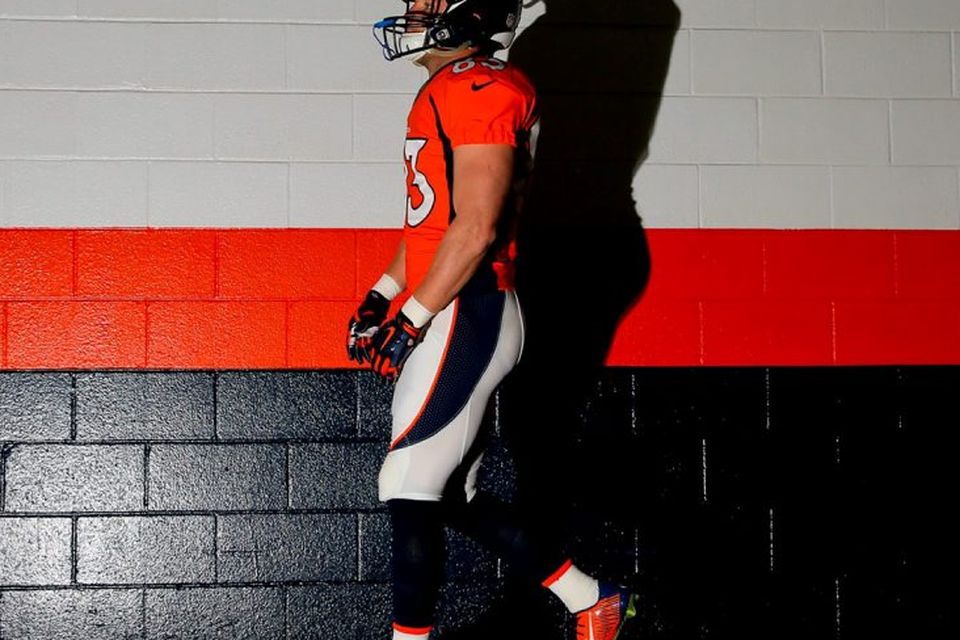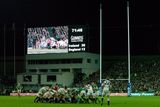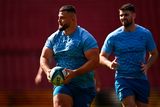Neil Francis: Sorry tale of NFL star Wes Welker highlights drug abuse as another consequence of concussion
It's not just about concussion anymore, we now have to deal with drug abuse and suicide
Wes Welker traded on being sharper than his defensive opponent — speed of mind compensated for his lack of size
Yeah, I know this is an article on concussion and generally people gloss over the subject - but this is worth the read.
I read a piece about Wes Welker, a slot receiver for the New England Patriots who spent six years there and played in two (losing) Super Bowls. He then left for the Denver Broncos for a two-year stint where he played in another Super Bowl, again on the losing side. Welker's value was his speed, dexterity and reliability. He was much smaller than the average receiver but his figures were consistently the best in the league.
Two weeks ago aged just 34 he was in hock to his wife and three-month old twin daughters. The player was sitting at home waiting for the phone to ring. Denver had released him and he was a free agent - a very free agent. It is part of the free agency code: you eat what you kill, no contracts, no guarantees, but the dough can be very good for the short term. Thing is, though, you belong to no organisation. There is no infrastructure there to get you into the sort of shape that a prospective NFL franchise wants you to be in. You might train the whole season and nobody picks you up. No play and more importantly, no pay. Another season gone.
Welker's frustration was palpable in any of the pieces I read; he was ripped, in the best physical condition of his life. 'Here I am, somebody pick me up'. He looked at games when the schedule had moved into the regular season. Turkeys playing for decent teams. He went from impatient to impetuous. Ten weeks into the regular season changing his daughters' nappies and still nothing.
I have watched this guy play for eight seasons. Yes he did play with Tom Brady and Peyton Manning, the two best quarterbacks in the league, but he would still be good enough and able to make a contribution even when he is 40. Why wasn't anyone coming in for him?
In his second year of a two-year contract, Welker picked up three pretty bad concussions with Denver. This in conjunction with a similar history with New England meant his contract was not renewed. Welker's performance dropped off dramatically in his second year. Some of this can be attributed to a very talented wide receiver roster who got the ball thrown to them more regularly, some of it to increased age and, well, some of it to being concussed three times throughout the season.
It is part of the player dilemma as to how much you report. It is one of the things that people miss when it comes to concussion. You play an 80-minute match once a week but you are training five days of that week and how many more hits are sustained at training? You just carry on. It was just a bang.
Players with a history of concussion are bad news in the NFL. Quite apart from the multi-billion dollar CTE class actions against the NFL which mean a lot of teams are now conjoined in litigation. You can sign as many waivers and exclusion clauses as you like but agents and lawyers will go after teams when something bad happens.
'You knew our man had a history and you played him and you kept playing him and you knew it was dangerous for our client.' Ker-ching!
The teams in the league won't take the risk. Correctly. The players know they won't get a contract if there is a sniff of consistent brain injury following them around.
Ten weeks into the season nobody is taking a chance on a bona fide superstar. This is where the story gets interesting.
In his last season, Welker was done for using performance enhancing drugs, which led to a four-week ban and a serious loss of earnings. Steroids, you would think. Not at all, it was the drug of choice in American sport . . . yep, you can understand why, but the real reason becomes apparent and you exhale in a dreary sense of desperation.
Adderall is an amphetamine and a psycho-stimulant and is prescribed mainly to children and adolescents who suffer from Attention Deficit Hyperactivity Disorder (ADHD). They say that in the US, four per cent of the population suffer from ADHD. I am not sure if I am surprised by the figure or not. What I do know is that in major league baseball, nine per cent of the playing population have a TUE (Therapeutic Use Exemption) for this drug. Do the maths yourself. If the national average is four per cent . . . This must mean that the drug really works.
What does it do and how does it enhance your performance? Firstly, it is a substance that generally makes you smarter, sharper, more aware; it gives you a greater working memory, cognitive enhancement and greater cortical efficiency.
If you are playing football its properties give you greater reaction times, greater alertness, increased stamina and make you far sharper in practically every mental and motor task. It is of course banned by WADA and every major American sports organisation.
Welker traded on being sharper than his defensive opponent - speed of mind compensated for his lack of size. He was not taking Adderall because of any diminished natural ability, he took it because he had to take it. People who have suffered concussive trauma are prescribed Adderall because the drug cuts through the brain fog associated with chronic concussion injury and gives greater clarity and focus to the patient. It's hard to play a game of football if it feels like you are wearing a balaclava on the inside of your head.
Unfortunately with the territory that Welker is in, reduced processing speed and lower attention and reasoning levels and cognitive impairment are not the only symptoms you have to fight on a daily basis. Depression and mood swings are a constant, particularly when you finish playing.
A 'molly' is something, I must confess, I had never heard of. Its principle component is MDMA. The kids will tell you what it is: ecstasy. MDMA was originally produced to treat depression. There was an element of dismay so when Welker was accused of having taken the drug. An accusation which he denied.
Many people in the USA have appealed to Welker to stop playing before he makes his condition a lot worse. It would seem that this is not going to happen, as the St Louis Rams picked him up last week and we wait for the inevitable to happen.
In the NFL, one in three players suffer significant brain trauma. One third of all concussions go unreported and you are eight times more likely to suffer Alzheimer's or dementia after your career ends.
Of the brains donated to the Boston Brain Bank in Massachusetts by former NFL players, nearly all have shown CTE damage. The only way to diagnose CTE is after death and of the many donors - some of whom committed suicide resulting from depression - most of them decided to die by gun. Most of the former players were conscientious enough to shoot themselves through the heart so that their brain would be viable for research, often stipulating this in their suicide notes.
There are six games left in the regular season and the fervent hope is that Welker gets through these without any further damage and then decides to retire to enjoy family life.
Meanwhile, on this side of the pond, Leinster get beaten 33-6 by Wasps in Europe. The other score in that game was Leinster 3 Wasps 0. It is incredible that reportage of that matter mentions the three Leinster concussions that day as if it were collateral damage.
Back in February of this year, Leinster also lost three players to concussion in their match against the Dragons - Noel Reid, Tom Denton and Richardt Strauss. Last Sunday week against Wasps, Strauss received another brain injury within nine months of the one in February. How many concussions are there per season in the professional ranks?
Sean O'Brien's concussion was far scarier and examination of the video provoked some debate. All this concussion is not good for business on the field. As Leinster looked like they could inveigle an unlikely victory in Bath last week, a poor throw by replacement hooker James Tracy proved very costly. Strauss should have been either starting or on the bench to take that throw. Strauss's normal replacement, Aaron Dundon, is also recovering from a lengthy concussion protocols procedure after the game against Glasgow on October 25.
It is a matter of regret that Kevin McLaughlin had to retire on medical advice because of continuous concussion injuries. In his prepared speech on the announcement of his retirement he stated that the highlight of his career was "the two Heineken Cups that will live long in the memory".
The question has to be asked: how long will that memory be?
I think I am going to have to do something about this. Watch this space.















